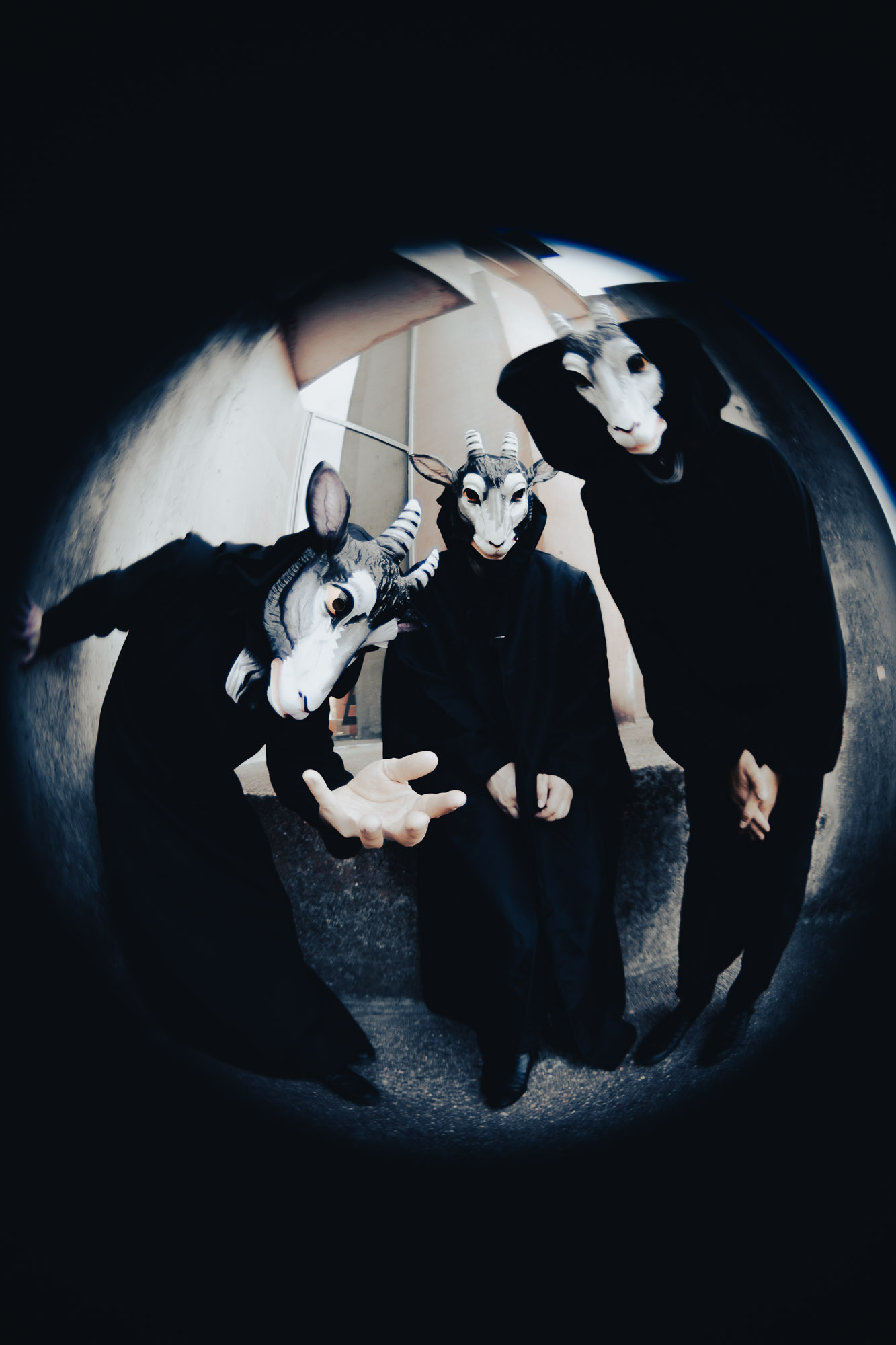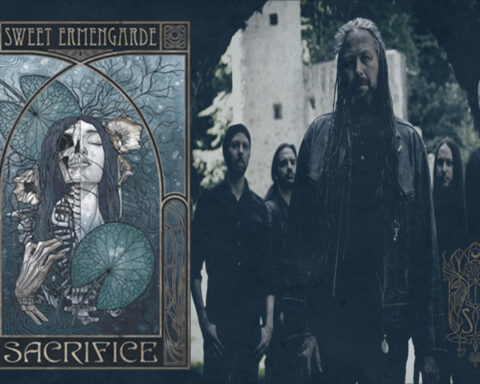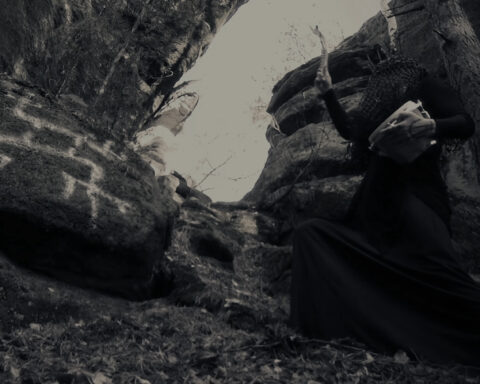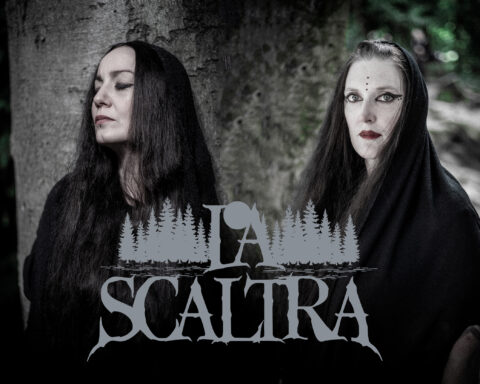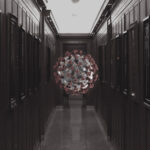[german version – english below]
Welcome to GOATopia! Am 28. Januar 2022 veröffentlicht Solar Lodge das sechsten Album von The Devil and the Universe. Im musikalischen Strudel von utopischen Visionen und Wunschtraumbildern einer vergangenen Zukunft! Das neue Album von THE DEVIL & THE UNIVERSE wirbelt sich in die Gehörgänge der Zuhörer, schürt die Fantasie und nimmt sie mit. Wir unterhielten uns mit den Ziegen über die utopischen Auswüchse und Schöpferkräfte, lasst uns auf die Reise gehen!
„GOATopia!“ man beachte die Schreibweise und der geneigte TDATU Anhänger erwartet die Übernahme der Ziegen in einer anderen, neuen Gesellschaftsordnung. Liebe Ziegen: bitte führt uns etwas ein in die Utopie-Ideen und die Ausgangslage des neuen Albums.
Konzeptionell orientiert sich GOATopia an so großen Utopisten wie Thomas Morus. Sein Roman „Utopia“ aus 1516 gilt als Begründer des Genres, das eine mögliche zukünftige Lebensform oder Gesellschaftsordnung formuliert. Thomas Morus erzählt von einem fiktiven Inselreich, auf dem neue Gesellschaftsentwürfe gelebt werden. Wir greifen Ideen wie diese auf und erschaffen unsere Ziegen-Utopie. In einer Welt, die aus dem Gleichgewicht geraten ist und einer Dystopie immer ähnlicher wird, demaskieren wir das Schreckgespenst Zukunft, um ihm die Ziegenmaske aufzusetzen.
Auf mich wirken der Albumtitel und das Artwork wie eine Symbiose. Monumentalbauten in einer kargen Landschaft. Die Ziegen etwas verloren zwischen Beton und Einsamkeit. Sind die Bilder auch zusätzlich bedeutsam für die Thematik der Utopie bzw. für die dystopischen Szenen?
Wie immer bei uns ergibt das Artwork und die Musik ein großes Ganzes. Man geht ja heutzutage sehr locker mit dem Begriff Gesamtkunstwerk um. Ich finde aber, dass das auf uns voll und ganz zutrifft. Diese neo-futuristisch anmutenden Gebäude passen hervorragend zu dem, was wir im Kopf hatten und wie wir uns die Optik zu der Musik vorgestellt hatten. Sie wirken auf den Betrachter sowohl futuristisch als auch nostalgisch. So wie das Album selbst, wo wir uns an eine Zukunft erinnern, die niemals gewesen sein wird.
Was wäre für dich eine dystopische Vorhersage, die dich binnen weniger Stunden zu einem bedeutsamen Handeln bringen/zwingen würde? Hierzu sei angemerkt, dass dystopische Szenen Zukunftsschilderung mit negativem Inhalt sind.
Da muss ich nicht lange nachdenken: der Klimawandel. Der ist Dystopie genug, da braucht man sich keine Zombie-Apokalypse oder dergleichen ausdenken. Und er hat mich bereits zum Handeln gezwungen, ich esse aus klimatechnischen Gründen kein Fleisch mehr und ernähre mich hauptsächlich vegan. Auch mein Konsumverhalten habe ich geändert. Das, was uns in den nächsten Jahrzehnten erwartet, wird von der breiten Masse vollkommen unterschätzt. Da wird es noch ein böses Erwachen geben.
Ich finde, jeder sollte etwas dazu beitragen, dass es hoffentlich nicht ganz so schlimm wird. Niemand muss ein Heiliger werden. Aber schlimm wird es werden, wir kommen da nicht mehr nur mit einem blauen Auge davon. Das sind Wahrheiten, die nur wenige hören wollen und mit denen man auch keine Wahl gewinnt. Die Klima-Dystopie hat längst begonnen. Das was wir jetzt erleben, sind nicht mal die ersten 4 Takte des Intros.
Die erste Single „Great God Pan Is Dead” zeigt euch im Reigen von wirren Anbetungsriten inmitten von einem Protagonisten, welcher sich zwischen Pans Tod und Auferstehung bewegt. Gab es ein Drehbuch oder war das Spontane euer Geleit für die Szenen?
Es gab eine Grundidee, aber kein Drehbuch an sich. Wir konnten uns glücklich schätzen, dass „The Great God Pan Himself“ gerade Zeit hatte, uns in sein okkultes Wissen einzuweihen. Das Video ist im Grunde ein Pan-Ritual. Die Invokationen, die man hier sieht, sind echt. Natürlich sind sie das. Es ist Pan selbst, der hier zugange ist.
Vergangenheit – Gegenwart – Zukunft – Utopie. Sind es nicht all diese Ebenen, denen wir Erinnerungen, Erwartungen, Wünsche und Träume zuordnen? Welcher Song auf dem neuen Album kommt diesen Ebenen am nächsten?
Hmm, das kann ich beim besten Willen nicht beantworten. Ich habe keine Ahnung. Solche Überlegungen überlassen wir dann der geneigten Hörerin. Da gibt es kein richtig oder falsch.
„Spleen Cockaigne“ übersetzt „Milz-Schlaraffenland“, der Song ertönt und man hat das Gefühl, auf eine Besichtigung, Reise zu gehen. Irgendwie ist die Stimmung verbunden mit einer neugierig-überraschen Entdeckungsfahrt, die jedoch ziellos ist. Was waren eure gedanklichen Ansätze zu diesem Song und dem Songtitel?
Spleen ist hier im Sinne von schlechter Laune oder Melancholie gemeint, vielleicht auch Wut. All dies sind weitere Bedeutungen des englischen Wortes Spleen. Es stimmt, der Track hat tatsächlich etwas von einer Entdeckungsfahrt und mit seinen Flöten-Samples aus dem Melotron hat er ganz bewusst auch etwas von einer Reise in eine Vergangenheit, die niemals war. Oder ist es doch eine Zukunft, die nie sein wird? Es war der erste Song der für das Album geschrieben wurde und es ist sehr selten, dass der erste Song überhaupt auf einem Album endet. Ich halte ihn für einen der Highlights der Platte.
Was, wenn der Wunschtraum zum Albtraum wird? Ist GOATopia die Rettung? Gibt es keine positive Verheißung der Zukunft mehr?
Die Zukunft war auch schon mal besser, so könnte man es zusammenfassen.
Allerdings finde ich, dass diese Platte nicht einfach nur Trübsal bläst und in selbstgerechter „Doom & Gloom“ Stimmung versinkt. Gerade gegen Ende, wenn wir in GOATopia ankommen, mit den Songs Echotopia und Psychogeography klingt so etwas wie Friede nach einem langen Kampf mit. Oder ist es doch nur die Ruhe vor dem Sturm? Niemand weiß, was die Zukunft bringt, aber sie wird kommen.
Kennt ihr das Gedankenexperiment vom Urzustand der Menschheit? In einem fiktiven Zustand existiert noch keine Gesellschaft, es gibt keine Rechte und Pflichten, es herrschen neutrale Verhältnisse zwischen den Menschen. Alle Informationen zu sich und einer Gesellschaft sind den Menschen verborgen unter dem Schleier des Nichtwissens. Damit lässt sich eine Debatte über Gerechtigkeit führen, vielleicht ergibt sich daraus eine neue Utopie mit einem besseren sozialen Miteinander. Inwieweit bewirkt das neue Album philosophisches Denken?
Das sind Gedankengänge, die natürlich wunderbar zu diesem Album passen. Aber auch hier will ich der Hörerin nicht zu viel vorwegnehmen. Die Utopie des einen ist womöglich die Dystopie des anderen – oder umgekehrt. Über alternative Gesellschaftsformen nachzudenken, die nicht sehenden Auges dem Neoliberalismus ins Verderben folgen, ist nie ein Fehler. Wenn unsere Musik dazu anstiftet, umso besser. Wer weiß, vielleicht hört ja der nächste Karl Marx beim Verfassen seines Manifests GOATopia. Eine reizvolle Vorstellung.
Elektronischer, technischer, psychedelischer und kältere Sounds. Aber auch viel Vertrautes erwartet den geneigten TDATU Hörer. Habt ihr viel mit neuen Sounds und den Instrumentierungen rumexperimentiert?
Es war einer jener Platten, bei der sehr schnell klar war, welche Sounds und Synthesizer wir verwenden müssen, um den Klang zu erzeugen, den es braucht. Alte String Machines, billige 70er Jahre Drumcomputer, viel Tape Manipulation, damit alles schön wabert und etwas verstimmt klingt. Das Melotron, so was wie der ersten Sampler, kam viel zum Einsatz. Alles Instrumente aus einer Zeit, in der man sich die Zukunft noch ganz toll vorstellte und dachte, im Jahr 2000 leben wir alle glücklich und zufrieden auf dem Mars. Auch das Songwriting an sich ging sehr schnell. Nur der Mix hat diesmal so viel Zeit in Anspruch genommen wie noch nie. Wir machten dazwischen eine längere Pause. Das war gut und hat die nötige Distanz geschaffen, um zu verstehen, was an den Mixen noch nicht gepasst hat. Am Ende war es genau richtig so. Rein vom Klang und der Produktion sind wir auf einem Level angekommen, der mich sehr glücklich macht.
Der zweite Song „Eschaton“ steht nach theologischer Wortherkunft für die apokalyptische Herrschaft Gottes vor dem Ende der Welt. Ist das der Zustand, bevor die Utopie Realität wird? Dauert er an?
Apokalypse, heißt ja so was wie Enthüllung oder Offenbarung. Und keine Enthüllung ohne die Erkenntnis, was schiefläuft. Deshalb steht der Song auch am Beginn der Platte, noch in der ersten Phase sozusagen.
2021 – nicht unbedingt ein Jahr, in dem Bands ganze Tourneen machen konnten. Das Zeitfenster für Einzelkonzerte oder Festivals war klein. Ihr wart dennoch zurück auf der Bühne. Wo habt ihr gespielt und wie fühlte es sich nach so langer Bühnenabstinenz an?
Wir spielten seit Beginn der Pandemie nur eine einzige Show. Wir hätten zwar ein paar Mal die Möglichkeit gehabt aufzutreten, aber uns ist die Gesundheit der Goatheads, also unserer Fans, wichtiger als der egoistische Drang, endlich wieder auf eine Bühne zu kommen. Die Show am Wroclaw Industrial Festival in Polen fand zu einer Zeit statt, in der man sich bereits impfen lassen konnte und war natürlich ein schönes Erlebnis. Ich hatte im Vorfeld ein bisschen Bedenken, ob wir nicht 2 bis 3 Songs brauchen werden, um wieder ganz die Alten zu werden, aber nichts da. Es dauerte keine 2 Sekunden und alles war wie immer. Es fühlte sich so an, als hätten wir eine Woche davor die letzte Show gespielt. Sehr beruhigend, dass uns diese Zwangspause nicht aus dem Konzept gebracht hat.
Gab es im Live-Set auch schon Songs vom neuen Album?
Nein, das wollten wir nicht. Es war ja noch eine :Endgame 69:-Show.
Das hätte sich nicht richtig angefühlt.
Das Jahr 2022 ist noch jung und wir haben seit zwei Jahren die weltweite Pandemie. Tragt ihr noch Daten und Konzerte in eure Kalender ein? Welche Daten stehen schon als feste Termine drin?
Klar, langsam sollte man das auch. Ich bin sehr zuversichtlich, dass sich die Dinge jetzt wieder zum Besseren ändern. Ich glaube auch, dass alle Konzerte ab April stattfinden werden. Folgende Termine kann ich schon bestätigen:
21.05.2022 Viper Room, Wien, AT
03.06.2022 WGT Festival, Leipzig, DE
09.07.2022 CELEBRATA HINDRHEIMR, NOR
31.10.2022 Sinners Day Festival, Limburg, BE
Da wird auch noch das eine oder andere dazukommen.
Wissenschaftsglaube und utopisches Denken hängen in Science-Fiction Darstellungen eng zusammen. Fortschritt und Technik bereiten eher Sorge als Freude auf die nahende Zukunft. Haben euch diese Überlegungen beim Songwriting begleitet?
Das Problem ist, der Fortschritt darf halt nicht um seiner selbst willen und um jeden Preis stattfinden. Genau das geschieht im Moment in vielen Bereichen, angetrieben von einem Haufen Psychopathen der Big-Tech-Firmen, die nichts anderes im Sinne haben als eine waschechte Technokratie. Davon sind wir nicht sehr weit entfernt. Ich glaube, das sind Überlegungen, die jeder machen sollte. Beeinflusst hat uns das vielleicht insofern, als das in der Ziegen-Utopie diese Phase bereits überwunden wurde und die Ziege die Technokraten aufgefressen hat. Mahlzeit. Ich glaube „News From Nowhere“ wäre vielleicht der Song, der gut in diese Phase passt.
GOAT=Greatest of All Time! So eine bedeutungsvolle Erklärung passt so gut auf die Ziegen. Zufall?
Wer kann das schon mit Gewissheit sagen. Are we playing with Magick or is Magick playing with us? Magie oder doch Mystizismus? Der Übergang ist bei uns fließend und das eine schließt das andere nicht aus.
Brandneu: euer zweites Video zum Song: „Viva! GOATopia“. Wie kam es zu dieser Idee? Entwickelt ihr zusammen mit Edie Calie die Szenen? Ist das Bunte mittlerweile visueller Standard? (fragt eine sehr farbintolerante JS)
Wir haben meist eine Grundidee oder eine Art Story, die wir dann gemeinsam weiterentwickeln. WIr werfen uns die Ideen zu. In diesem Fall gab es allerdings keine Story, wir wollten einfach beide Foto-Locations vom Cover auch im Video zeigen. Die Locations sind sozusagen der vierte Charakter, die „Nicht Ziege“. Diesen gibt es bei uns ja in vielen Videos. Natürlich wollen wir uns nicht einschränken und alle Farben verwenden, die es gibt. Nur schwarz / weiß wäre für mich in etwa so, als würde ich auf einer Gitarre nur eine Seite benutzen. Kann man machen – Reduktion kann auch was Gutes sein – aber in dem Fall wollten wir es so psychedelisch wie möglich haben und „Bewusstseinserweiterungsoptik“ hat viel mit Farben zu tun. Nur so erreichen wir diesen psychedelischen Effekten, der auch in der Musik stark vorhanden ist. Wir haben da keinerlei Berührungsängste und auch keinerlei Standards. Alles ist möglich, solange es der künstlerischen Verwirklichung hilft. Vielleicht sieht man im nächsten Video einfach nur einen schwarzen Balken. Wir machen, was unsere Musik und die Vision dahinter braucht. Vielleicht sieht man uns aber auch in einem gelben Unterseeboot durch das Meer der Zeit tauchen. Aber da müssen wir wohl vorher mit unserem Anwalt reden.
Billy Phobia hat wieder das Design für T-Shirts und Baumwollbeutel entworfen. Welchen Leitgedanken hat ihn zu dieser Darstellung der Ziegen im Reigen mit Menschen begleitet? War es für euch sofort passend? Oder braucht es ab und an mehrere Entwürfe, um sich final für ein T-Shirt Motiv zu entscheiden?
Diesmal brauchten wir tatsächlich ein paar Entwürfe, bis das Richtige dabei war. Utopien an sich sind ein eher abstraktes Thema und es war nicht so ganz klar, was es da genau braucht. Ich bespreche mit Billy das Thema der Platte, wir brainstormen und so kommen wir dann ans Ziel. Dieser Holzschnitt aus dem Mittelalter passt wunderbar. Ein Ziegen-Reigen losgelöst von den Restriktionen und Sorgen der Welt. Viva! Goatopia eben.
Allerbesten Dank werte Ziegen.
Viva GOATopia! Lang leben die Ziegen. Auf bald!
[english version – german above]
Welcome to GOATopia! On January 28, 2022, Solar Lodge will release the sixth album by The Devil and the Universe. In the musical whirlpool of utopian visions and dreamlike images of a bygone future!“ The new album by THE DEVIL & THE UNIVERSE spins its way into the listeners‘ ears, stirs the imagination, and takes them along. We talked with the goats about the utopian excesses and creative forces—let’s embark on the journey!
“GOATopia!” Note the spelling, and the dedicated TDATU fan anticipates the takeover of the goats in a new societal order. Dear Goats: please introduce us a bit to the utopian ideas and the premise of the new album.
Conceptually, GOATopia is inspired by great utopians like Thomas More. His 1516 novel „Utopia“ is considered the founding work of the genre, formulating a possible future way of life or societal order. Thomas More tells of a fictional island realm where new social designs are lived. We take up ideas like these and create our goat utopia. In a world that has fallen out of balance and increasingly resembles a dystopia, we unmask the bogeyman of the future by putting the goat mask on it.
To me, the album title and the artwork seem like a symbiosis. Monumental buildings in a barren landscape. The goats somewhat lost between concrete and solitude. Are the images also significant for the theme of utopia or the dystopian scenes?
As always with us, the artwork and music form a cohesive whole. Nowadays, people use the term „Gesamtkunstwerk“ (total work of art) quite loosely. But I think it fully applies to us. These neo-futuristic buildings fit perfectly with what we had in mind and how we envisioned the visuals for the music. They appear both futuristic and nostalgic to the viewer. Just like the album itself, where we remember a future that never will be.
What would be a dystopian prediction that would force you to take significant action within a few hours? It should be noted that dystopian scenes depict a future with negative content.
I don’t have to think long about that: climate change. That’s dystopian enough; no need to invent a zombie apocalypse or something similar. It has already forced me into action; I no longer eat meat for climate reasons and mostly follow a vegan diet. I have also changed my consumption behavior. What awaits us in the coming decades is vastly underestimated by the general public. There will be a rude awakening. I think everyone should contribute to hopefully making it not quite as bad. No one has to be a saint. But it will get bad; we won’t just get away with a black eye. These are truths that few want to hear, and with which one cannot win an election. The climate dystopia has long begun. What we are experiencing now are not even the first four bars of the intro.
The first single, “Great God Pan Is Dead,” shows you in the midst of chaotic worship rituals, with a protagonist moving between Pan’s death and resurrection. Was there a script, or was spontaneity your guide for the scenes?
There was a basic idea but no script as such. We were fortunate that “The Great God Pan Himself” had time to initiate us into his occult knowledge. The video is essentially a Pan ritual. The invocations you see here are real. Of course, they are. It is Pan himself who is at work here.
Past – Present – Future – Utopia. Aren’t these all levels to which we assign memories, expectations, wishes, and dreams? Which song on the new album comes closest to these levels?
Hmm, I can’t really answer that. I have no idea. We leave such considerations to the listener. There is no right or wrong.
“Spleen Cockaigne” translates to “Melancholy Paradise.” The song plays, and you feel like you’re going on a sightseeing trip. Somehow the mood is connected to a curious-surprised exploration journey that is, however, aimless. What were your thoughts on this song and its title?
Spleen here means bad mood or melancholy, maybe even anger. These are all further meanings of the English word „spleen.“ It’s true; the track does have something of an exploration journey and with its flute samples from the Mellotron, it consciously has something of a journey into a past that never was. Or is it a future that never will be? It was the first song written for the album, and it’s very rare for the first song to end up on an album at all. I consider it one of the highlights of the record.
What if the dream becomes a nightmare? Is GOATopia the salvation? Is there no positive promise for the future anymore?
One could summarize it as: the future used to be better. However, I think this record doesn’t just mope around and sink into a self-righteous “doom & gloom” mood. Especially towards the end, when we arrive in GOATopia, with the songs “Echotopia” and “Psychogeography,” there is something like peace after a long struggle. Or is it just the calm before the storm? No one knows what the future holds, but it will come.
Do you know the thought experiment about the original state of humanity? In a fictional state, no society exists yet, there are no rights and duties, neutral conditions prevail among people. All information about themselves and a society is hidden from people under the veil of ignorance. This can lead to a debate about justice; perhaps a new utopia with a better social coexistence will emerge. To what extent does the new album provoke philosophical thinking?
These are thoughts that naturally fit wonderfully with this album. But even here, I don’t want to give too much away to the listener. The utopia of one may be the dystopia of another—or vice versa. Thinking about alternative social forms that do not blindly follow neoliberalism to ruin is never a mistake. If our music inspires this, all the better. Who knows, maybe the next Karl Marx will be listening to GOATopia while writing his manifesto. An enticing idea.
More electronic, technical, psychedelic, and colder sounds. But also much familiar for the dedicated TDATU listener. Did you experiment a lot with new sounds and instrumentation?
It was one of those records where it quickly became clear which sounds and synthesizers we needed to create the sound we envisioned. Old string machines, cheap 70s drum machines, lots of tape manipulation to make everything wobbly and slightly out of tune. The Mellotron, something like the first sampler, was used a lot. All instruments from a time when people still had great expectations for the future and thought by the year 2000 we would all be living happily on Mars. Even the songwriting itself went very quickly. Only the mix took as much time as ever before. We took a longer break in between. That was good and created the necessary distance to understand what still needed to be fixed in the mixes. In the end, it was exactly right. Purely in terms of sound and production, we have reached a level that makes me very happy.
The second song “Eschaton” stands for the apocalyptic rule of God before the end of the world according to theological terminology. Is this the state before utopia becomes reality? Does it last?
Apocalypse means something like revelation or disclosure. And no revelation without the realization of what is going wrong. That’s why the song is at the beginning of the record, still in the first phase, so to speak.
2021—not exactly a year when bands could go on full tours. The time window for single concerts or festivals was small. Yet, you were back on stage. Where did you play, and how did it feel after such a long stage absence?
We only played one show since the beginning of the pandemic. We had a few opportunities to perform, but the health of the Goatheads, our fans, is more important to us than the selfish urge to get back on stage. The show at the Wroclaw Industrial Festival in Poland took place at a time when people could already get vaccinated and was, of course, a nice experience. I had some concerns beforehand that we might need 2-3 songs to get back into the groove, but not at all. It took less than 2 seconds, and everything was as it always was. It felt like we had played the last show just a week before. Very reassuring that this forced break did not throw us off our game.
Were there any new songs from the album in the live set?
No, we didn’t want that. It was still an “Endgame 69” show. That wouldn’t have felt right.
The year 2022 is still young, and we have had the global pandemic for two years now. Do you still enter dates and concerts into your calendars? Which dates are already set?
Of course, one should start doing that. I am very optimistic that things will change for the better now. I also believe that all concerts from April onwards will take place. I can already confirm the following dates:
- 21.05.2022 Viper Room, Vienna, AT
- 03.06.2022 WGT Festival, Leipzig, DE
- 09.07.2022 CELEBRATA HINDRHEIMR, NOR
- 31.10.2022 Sinners Day Festival, Limburg, BE
There will be more dates to come.
Belief in science and utopian thinking are closely linked in science fiction depictions. Progress and technology are more worrisome than a joy for the near future. Did these considerations accompany you during songwriting?
The problem is that progress must not take place for its own sake and at any cost. That is exactly what is happening in many areas, driven by a bunch of psychopaths from big tech companies who have nothing else in mind but a genuine technocracy. We are not very far from that. I think these are considerations that everyone should have. It may have influenced us in the sense that in the goat utopia, this phase has already been overcome, and the goat has eaten the technocrats. Bon appétit. I think “News From Nowhere” might be the song that fits well into this phase.
GOAT = Greatest of All Time! Such a meaningful explanation fits the goats so well. Coincidence?
Who can say for sure. Are we playing with magic, or is magic playing with us? Magic or mysticism? The transition is fluid for us, and one does not exclude the other.
Brand new: your second video for the song “Viva! GOATopia.” How did this idea come about? Do you develop the scenes together with Edie Calie? Has color become a visual standard? (asks a very color-intolerant JS)
We usually have a basic idea or a kind of story that we then develop further together. We throw ideas back and forth. In this case, however, there was no story; we just wanted to show both photo locations from the cover in the video. The locations are, so to speak, the fourth character, the “non-goat.” This character appears in many of our videos. Of course, we don’t want to limit ourselves and use all the colors available. Only black/white would be like playing a guitar with only one string. It can be done—reduction can be good—but in this case, we wanted it to be as psychedelic as possible, and “consciousness-expanding optics” has a lot to do with colors. Only this way do we achieve the psychedelic effects that are also strongly present in the music. We have no reservations and no standards. Anything is possible as long as it helps with artistic realization. Maybe the next video will show just a black bar. We do whatever our music and the vision behind it require. Maybe we’ll be diving through the sea of time in a yellow submarine in the next video. But we’ll probably need to consult our lawyer first.
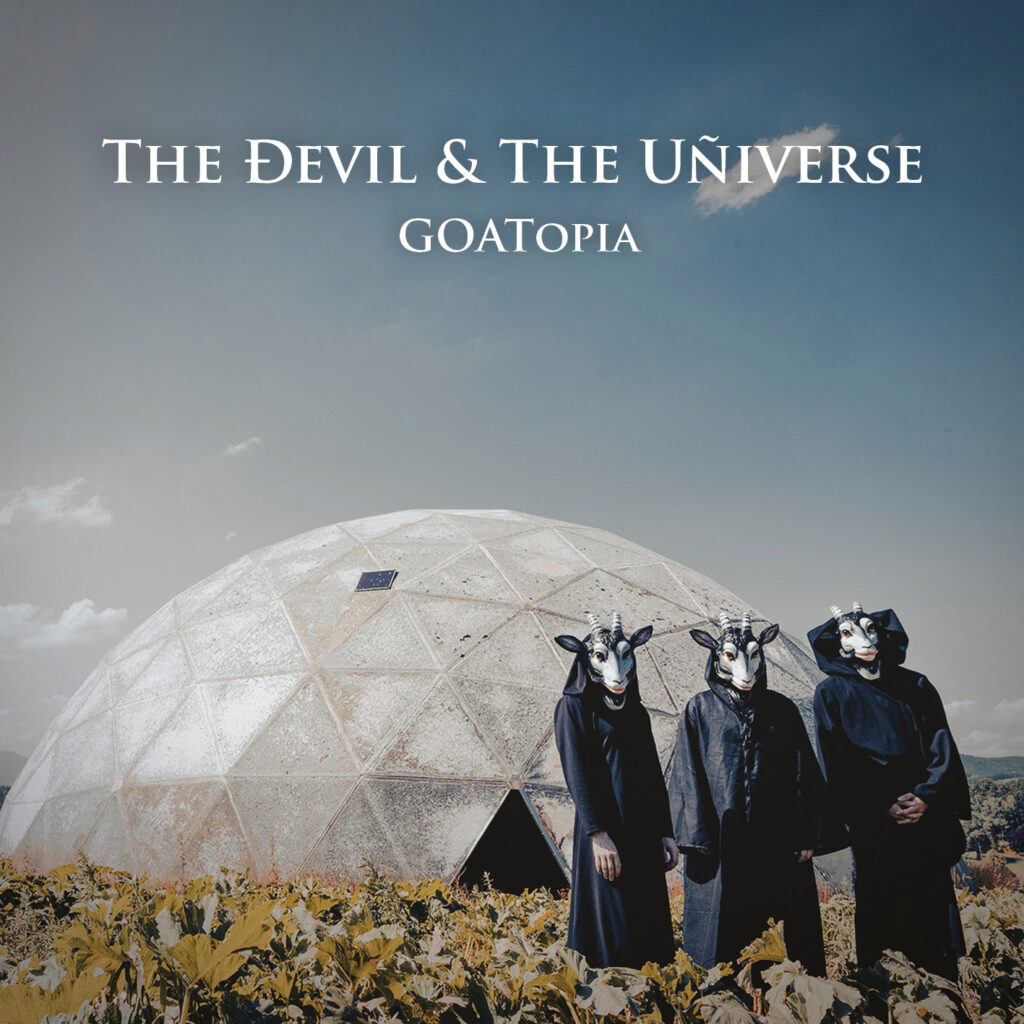
Billy Phobia has once again designed the artwork for T-shirts and cotton bags. What guided him to this depiction of goats in a dance with humans? Did it immediately feel fitting for you? Or does it sometimes take several drafts to finalize a T-shirt design?
This time, we actually needed a few drafts until we found the right one. Utopias are a rather abstract topic, and it wasn’t quite clear what exactly was needed. I discuss the album’s theme with Billy, we brainstorm, and that’s how we reach our goal. This medieval woodcut fits perfectly. A goat dance free from the world’s restrictions and worries. Viva! GOATopia indeed.
Many thanks, dear goats. Viva GOATopia! Long live the goats. See you soon!
.
.
.
.
.
.
.
.
.
.
.

